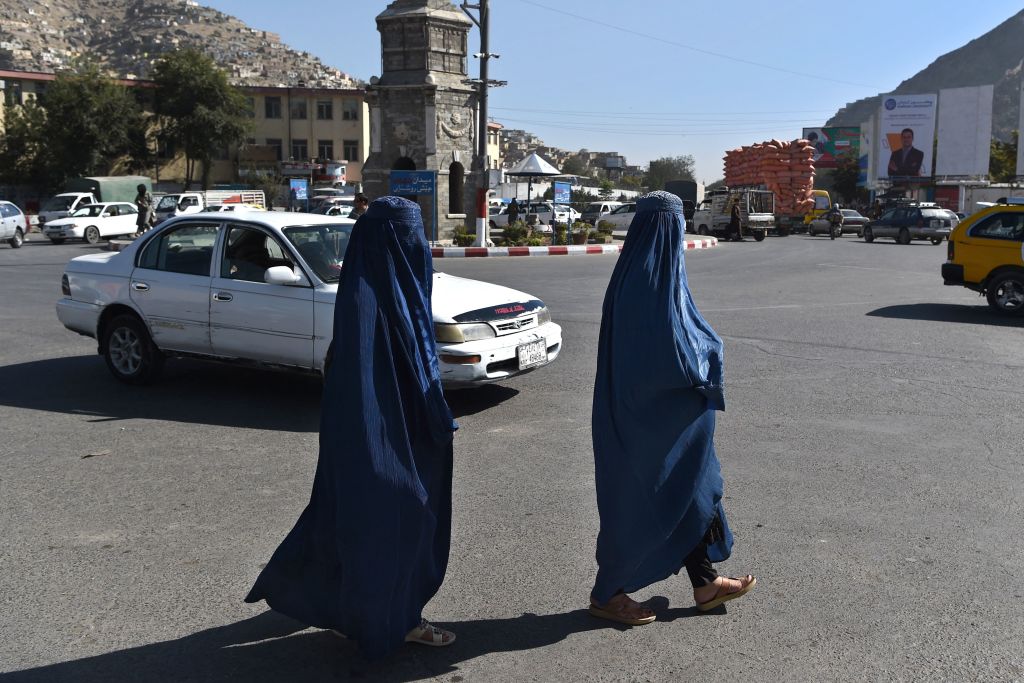Editor’s note: This story was produced in partnership with Rukhshana Media and is part of The Fuller Project’s ongoing series, “Ending America’s Forever War: What is next for Afghan women?”, documenting what the end of America’s longest war on foreign soil means for the women who have lived through it. Follow The Fuller Project’s continuing coverage here.
I will never forget 15 August 2021, the ominous day that took away almost everything from me. Now, like all women in Afghanistan, I can no longer achieve my goals and dreams because the day the Taliban entered Kabul, it was as though they burned our dreams and aspirations.
I am a female journalist working for a radio station. The day the Taliban entered Kabul, I went to a hotel to cover a press conference on women’s rights.
When I left the office for the conference, the city looked different than usual. There were few cars and people on the streets. It was as if everyone was waiting for something to happen. However, until 9 a.m. there was no news of the Taliban entering Kabul.
The press conference was still going on when one of my colleagues called saying Kabul had fallen, the Taliban had entered the city, and I should return home as soon as possible. When I heard this, it was as if I fell from the sky because I was afraid of the Taliban, especially given what I knew about their treatment of women. I checked my clothes to see if they seemed Islamic enough and if I could return home safely. In my view, my clothes were appropriate enough.
Being a journalist, every time I read about the Taliban going home to home after journalists, I would tremble with fear.
When I left the hotel, I was feeling exiled, and can you imagine how difficult it is to feel exiled in your own city? Not knowing what you should do and where to take refuge?
Unlike in the morning, when I was heading home, the city was very crowded. Everyone was fleeing as if the world was falling on us, and everyone was trying to save themselves. With great difficulty, I found a car that drove me home.
I forced myself to stay home for several days. Being a journalist, every time I read about the Taliban going home to home after journalists, I would tremble with fear. I had to hide every document that confirmed my identity as a journalist. I put my press card and educational records in a bag and buried them in the basement of our house.
Read more: Afghan journalist recounts harrowing escape from Afghanistan
After a week at home, I went back to my office, but I will never forget how scared I was leaving home. On my way to the office, I came across Taliban checkpoints. The Taliban’s armed fighters looked at the women angrily, and I understood the meaning of those looks: they were angry because women were leaving their homes.
My life has changed since that Sunday when the Taliban took Afghanistan. I no longer even have the right to choose my clothes, and I have to wear a hijab, a long black dress. I feel there’s nothing in my life but darkness. I have lost all my hopes, and I do not know what kind of days are awaiting us.
Two weeks after the Taliban arrived in Kabul, I went to cover a press conference organized by the Taliban. The Taliban security department told me that women were not allowed to take part in the meeting. When I introduced myself as a journalist, they reluctantly let me in. Although the press conference concerned government employees in a department where many women worked previously, no women were present in the meeting.
When I entered the hall, all the eyes turned to me, the only woman there. “This is not your place; why did you come here?” a senior Taliban member asked me. I repeated that I am a journalist and came to cover the conference. He looked at me in a humiliating way and said nothing more. According to the Taliban, women only benefit from housekeeping and childcare; women working outside is not acceptable to them.
The future seems dark, and I don’t know what fate awaits me, but I will continue to work until I am allowed to work outside the home.
Hadis (a pseudonym), 25, is a journalist. Translation by Sahar Fetrat.


 Hadis
Hadis
